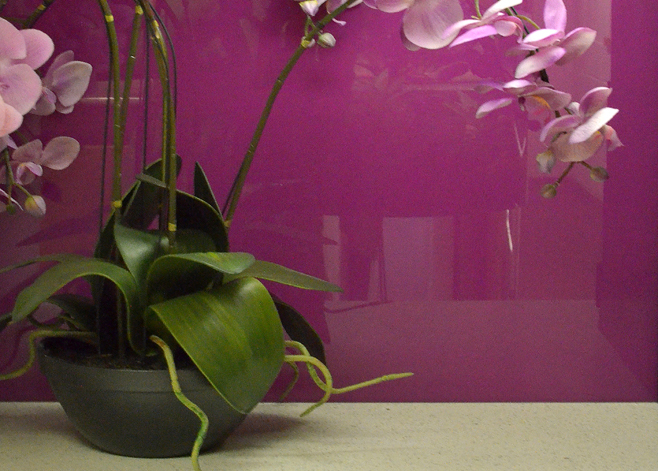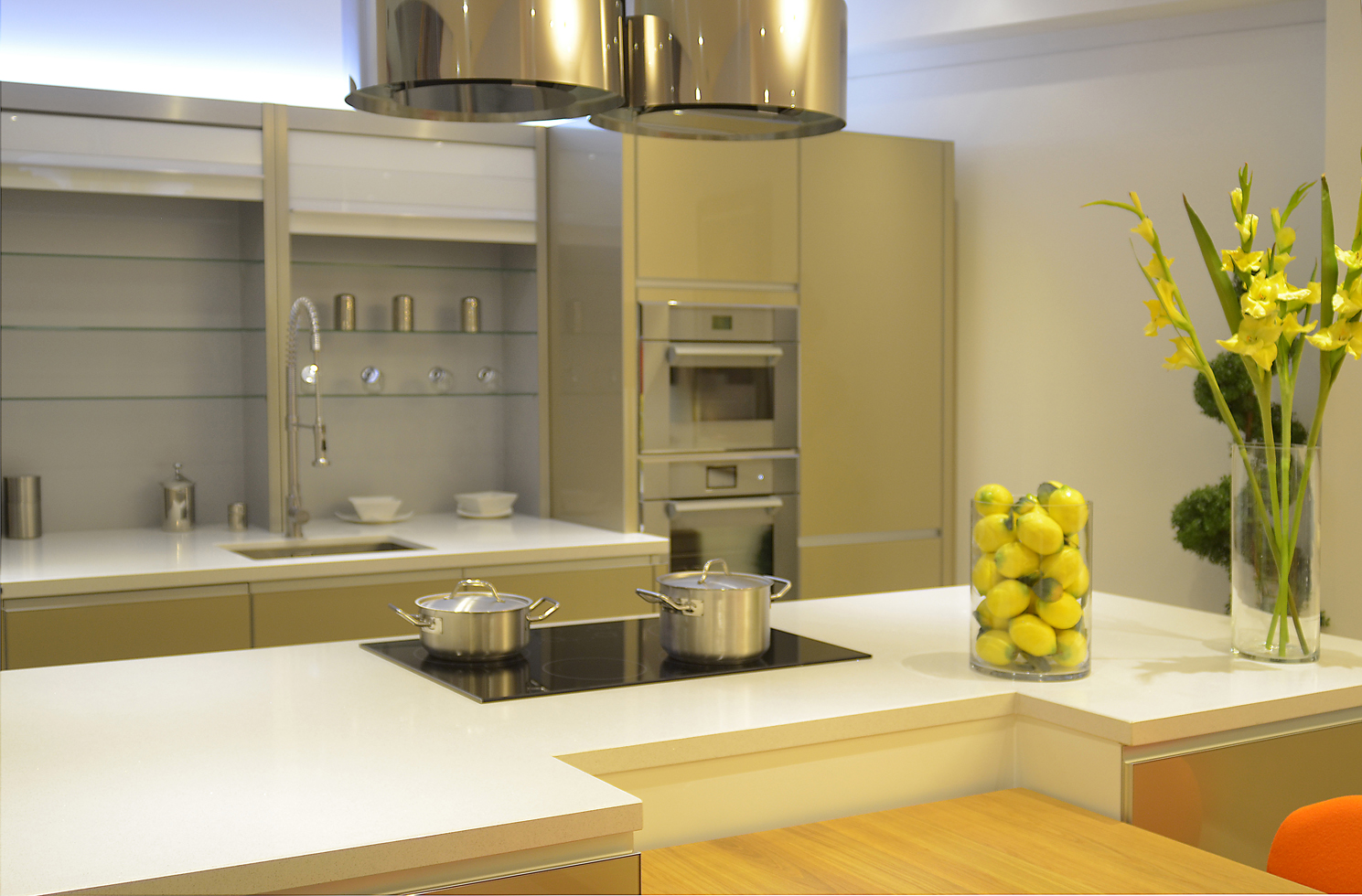X
Granite Surfaces
Many of us talk about granite worktops without actually appreciating its long life cycle before it brings our kitchens a healthy helping of luxury. We hope this helps.
Definition
Granite is an igneous rock composed of mostly two minerals: quartz and feldspar. It is an intrusive rock, meaning that it crystallized from magma that cooled far below the earth's surface. Its name is derived from the Latin word 'granum', which means 'grain', a reference to the easily-seen minerals in the rock.
Where Is Granite Found?
Much of the earth's continental crust is made of granite and it forms the cores of the continents. In North America, the landscape surrounding Canada's Hudson Bay and extending south to Minnesota consists of granite bedrock. Those rocks are part of the Canadian Shield, the oldest rocks on the continent.
Granite also is found below much of the rest of the middle of the continent. Buried under hundreds of feet of sedimentary rocks and glacier-deposited sediment, you'll find what's called basement rock. Granite can make up much of this foundation of the continents.
In mountain ranges like the Sierra Nevada, Appalachians, and Rocky Mountains, granite is found in huge masses of rock called batholiths, which form the roots of the mountains.
Granite Care
To keep granite worktops clean, we recommend you use a microfiber cloth to dust off the surfaces. Wipe down the granite countertops as needed using warm water. When possible wipe down the worktops with a damp cloth and a stone cleaner formulated with a neutral pH. Stay away from harsh chemicals and abrasive cleaners as they can scratch, pit, and etch the surface of the stone.
How often should I seal my granite counters?
How often you'll need to re-seal your granite depends on the absorption rate of your material, the type/quality of the granite and the products used for cleaning.
How often you should re-seal your granite worktops depends on several things. The absorption rate of your stone (porous or dense), the type/quality of the material, and the products used for cleaning the worktops.
Light colored granites and un-polished (honed, leathered) softer stones such as marble may need sealing every 1-3 years.
Dark colored granites (blues, blacks, browns and greys) can be sealed less frequently such as every 3-5 years.
Quote for Granite Surface
X
Quartz Surfaces
What we refer to as Quartz, which is a naturally occuring mineral, is actually an engineered stone containing quartz (94%), the remainder being made up of resin, colourant and other minerals. These elements are combined to create the beautiful variations available to you . When comparing quartz and granite worktops, their qualities are rather similar, but not identical.
One advantage of quartz is its uniform structure and extensive selection of colours that allows designing a personalised kitchen. Among many light shades, white quartz is particularly popular because there is no pure white rock (e.g. granite) available in nature. Various shades of the wide colour range of quartz makes it easy to combine them and match them to many other materials.
Caring for Quartz
Maintaining your quartz worktops is easy, you can simply wash them with a soft cloth and warm water. A mild soap can be used if desired however is not needed. We understand that sometimes spills do occur and can often be left to dry on the worktop. Any liquids that harden when they dry such as grease and/or paint should be removed be gently scraping away the residue with a blunt scraper. Then you can use a household vinegar/water solution with a non-abrasive cleaning pad to rinse the remaining residue from the surface.
Quartz worktops are non-porous, meaning that spills/stains are not absorbed into the surface making it stain resistant. Although you do need to avoid exposing your tops to any harsh chemicals. As Quartz is one of the hardest materials in nature, your worktops will not easily scratch and chip but we do always recommend using chopping boards to protect your surface. With a very small amount of care, your quartz worktops can look as good as they did the day they were first installed for years to come.
Quote for Quartz Surface
X
Solid Surfaces
Keep calm and Corian! Solid surface is manufactured by mixing acrylic or polyester resin with powdered bauxite filler and pigments. The material chemically cures and is heated to 60°C or more. Cured material is then cut in sheets or shapes and sanded on one or both sides depending the brand used. Sometimes the material is brought to 160°C and cooled, to improve its heat resistance.
Variation is the Spice of Life
Corian and Hanex solid surfaces are available in a wide range of colours and styles that can your tastes perfectly, corian worktops provide a perfect balance of style and durability.
Corian Care
We recommend cleaning your worktops with soapy water and/or ammonia based cleaners or even commercially available solid surface cleaners as these will remove most dirt and residue from all types of finishes. Stubborn residue will require a little stronger cleaner. Follow the recommendations in this care guide.
Hanex Care
One of the big advantages to choosing a solid surface worktop is that they are non-porous, low maintenance and seamless, meaning there are no unsightly dirt and bacterial traps that can be easily and quickly cleaned. For guidance on care and maintenance of your Hanex solid surfaces follow the recommendations in this care guide.
Quote for Solid Surface
X
Glass and Mirror
Chromaglaze and Glasspix are the latest products to be manufactured by our dedicated team in the heart of Lancashire. Oldham to be precise. At Vie Surfaces, we care about our work, and are passionate about providing top quality bespoke products to homes bars and hotels across the UK.
Whether its a standard glass splashback you need or beautifully crafted bespoke mural, we can give your home a distinctive touch. We toughen all our ranges as standard making our products 4 times stronger than normal glass, giving you peace of mind.
Chromaglaze
All our glass worktops and splashbacks are colour coated to any
colour and they all meet the British glazing standards. In addition to
beautiful colours you can also feature splashbacks wherever you need to
build in safety, for example as sliding doors for wardrobes, balustrade,
or shelf units.
Glass splashbacks have well and truly kicked the old stainless steel and tiled splashbacks into touch. There are lots of reasons why:
- Scratch resistant - Won't easily scratch with everyday cleaning
- Hygeinic - No grout lines to harbour germs
- Reflective - making the room appear brighter and bigger
- Versatile - pick whatever colour or image you want.
- Chromaglaze colour coated glass
- Bespoke size and colour
GlassPix
Our Glasspix product is quite unique. Your chosen image can be printed directly onto the glass, in full photographic quality, with a 10 year guarantee. Use it in the kitchen, On a mural or simply as a piece of art to mount on a wall.
Simple yet incredibly effective. Somehow the light reflects and refracts (apparently) creating vibrant and lifelike "deep" images to cover your walls. For the serious amateur photographers amongst you, and professional ones for that matter, doesn't this beat seeing your pictures on instagram or facebook momentarily? Why not give them pride of place on your walls in the most sleek, modern way possible? Impressive.
Quote for Glass










